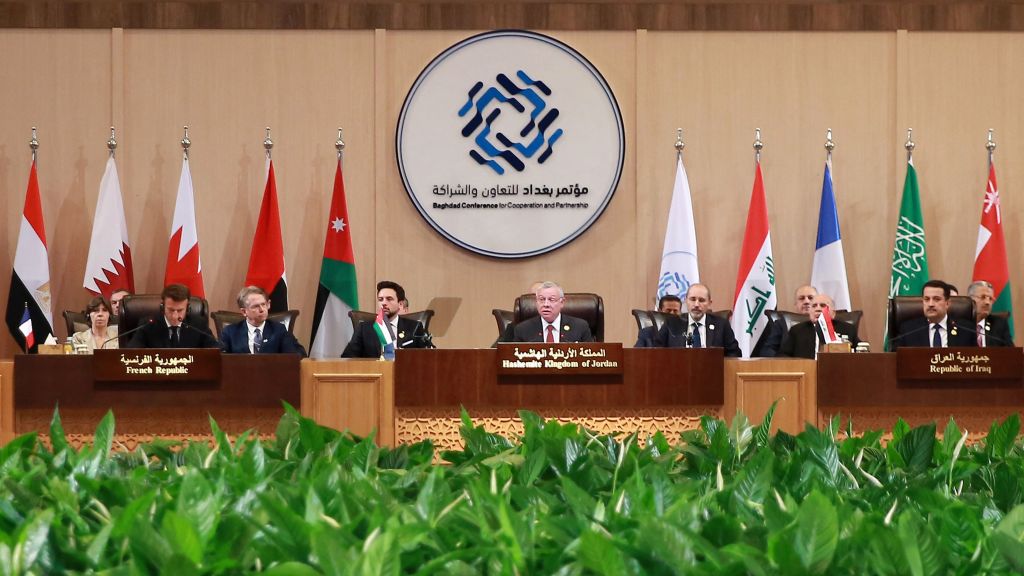Mideast and European Leaders Meet in Jordan To Strengthen Iraq
Jordan seeks to become key partner with Iraq in security, economic and diplomatic arenas
Leaders from several Middle East countries and countries in Europe gathered in Jordan for a summit centered on ensuring Iraq’s sovereignty, security and stability.
The second Baghdad Conference for Cooperation and Partnership took place on Tuesday. The participants discussed regional crises, with a focus on Iraq.
The summit was attended by Iraqi Prime Minister Mohammad Shia al-Sudani, Egyptian President Abdel Fattah el-Sisi, the ruler of the UAE’s Emirate of Ras al-Khaimah Sheikh Saud bin Saqr al-Qasimi, Iranian Foreign Minister Hossein Amir-Abdollahian, and Saudi Arabia’s Foreign Minister Prince Faisal bin Farhan al-Saud. The French-sponsored summit also attended by French President Emmanuel Macron reportedly hosted envoys from the United Arab Emirates, Qatar, Bahrain, Oman, the European Union, France and Turkey.
“Iraq today is the scene of [foreign] influences, incursions, destabilization that are linked to the entire region,” Macron told the conference, adding: “Iraq probably is, given the past decades, one of the main victims of regional destabilization.”
Jordan has long borders with Iraq, and for decades Iraq was considered a strategic neighbor and a vital area for the kingdom’s economy
Mahmood Baban, a research fellow at Rudaw Research Center, a think tank in Iraq, told The Media Line that the summit is another joint Iraqi-French effort to reduce foreign influence over Iraq. Still, he points out that two of the conference’s attendees, Iran and Turkey, have violated Iraq’s sovereignty and security several times this year and have not tried to conceal it. The major offense, he says, are the two countries’ operations in Kurdish areas in Iraq.
“The second Baghdad Conference should unquestionably discuss the issue of Iraq’s sovereignty and security because representatives of both countries that violate Iraq’s sovereignty are expected to attend,” he said prior to the start of the summit.
Romy Nasr, a MENA conflict analyst and stabilization adviser based in Iraq, told The Media Line that the conference was aimed at reviving some conversations that are fueling tensions in Baghdad and the area of the Kurdistan Regional Government, including political and security instability on the northeastern side of Syria.
She adds that the gathering also was a test of Iraq’s new prime minister, to ensure that he is following in the footsteps of his predecessor.
After a long-standing political crisis in Iraq, al-Sudani took office on October 27. His predecessor, Prime Minister Mustafa Al-Kadhimi, hosted the first Baghdad conference in the Iraqi capital in 2021, which was attended by Macron.
Nasr explains that the new Iraqi prime minister’s government is currently perceived as a pro-Iranian actor, which means that it is viewed with distrust in the West and in certain neighboring countries.
Al-Sudani’s participation in such a summit in a cooperative way is reassurance to the West, she notes.
It is “reassuring (to) Western countries and allies that he is following in the footsteps of Prime Minister Kadhimi and his support to President Macron’s initiative during Baghdad I. It is a chance for him to continue Kadhimi’s legacy, whose accomplishments were welcomed by the West, precisely Jordan and France,” Nasr added.
Iraq’s neighbor to the west, Jordan, has taken an active role in the organization and execution of both the Baghdad I and II conferences.
Hazem Salem Al Dmour, the general manager at the Amman-based think tank STRATEGIECS, says that it reflects the deepening relations between Jordan and Iraq.
He told The Media Line that this is especially seen in the areas of security and economics, in addition to the role that Jordan can play as a bridge linking Iraq to the rest of the Arab world.
“Jordan has long borders with Iraq, and for decades Iraq was considered a strategic neighbor and a vital area for the kingdom’s economy,” he explained.
According to Nasr, the Hashemite Kingdom’s approach to Iraq serves one core goal, which is improving Jordan’s economy.
She notes that after the multiple Iraqi economic setbacks over the past two decades in the wake of the fall of Saddam Hussein’s regime, the Arab Spring, the Syrian crisis and the rise of the Islamic State, Jordan’s close historical ties to Iraq “puts it [Jordan] in a position to seek access to reliable cheap oil by offering itself as a transit route for crude oil from Iraq through the planned Basra-Aqaba pipeline,” she said.
Al Dmour adds that, in addition to the economic interests, Jordan also seeks to cooperate with Iraq in combating terrorism inside its territory, in order to keep Iranian-backed armed groups away from Jordan’s eastern borders.
Aside from the security and stability of Iraq and ensuring that its internal arena is not a playground for regional and international powers, the conference also discussed emerging issues and threats resulting from the Ukrainian crisis and the COVID-19 pandemic, especially those related to food and energy security, as well as the countries’ follow-up on their commitment to combating terrorism and climate change issues.
Conference participants also addressed the subject of anti-government protests in sparked in September when 22-year-old Kurdish Iranian woman Mahsa Amini died in the custody of the Morality Police, who arrested her for not wearing her hijab properly.


